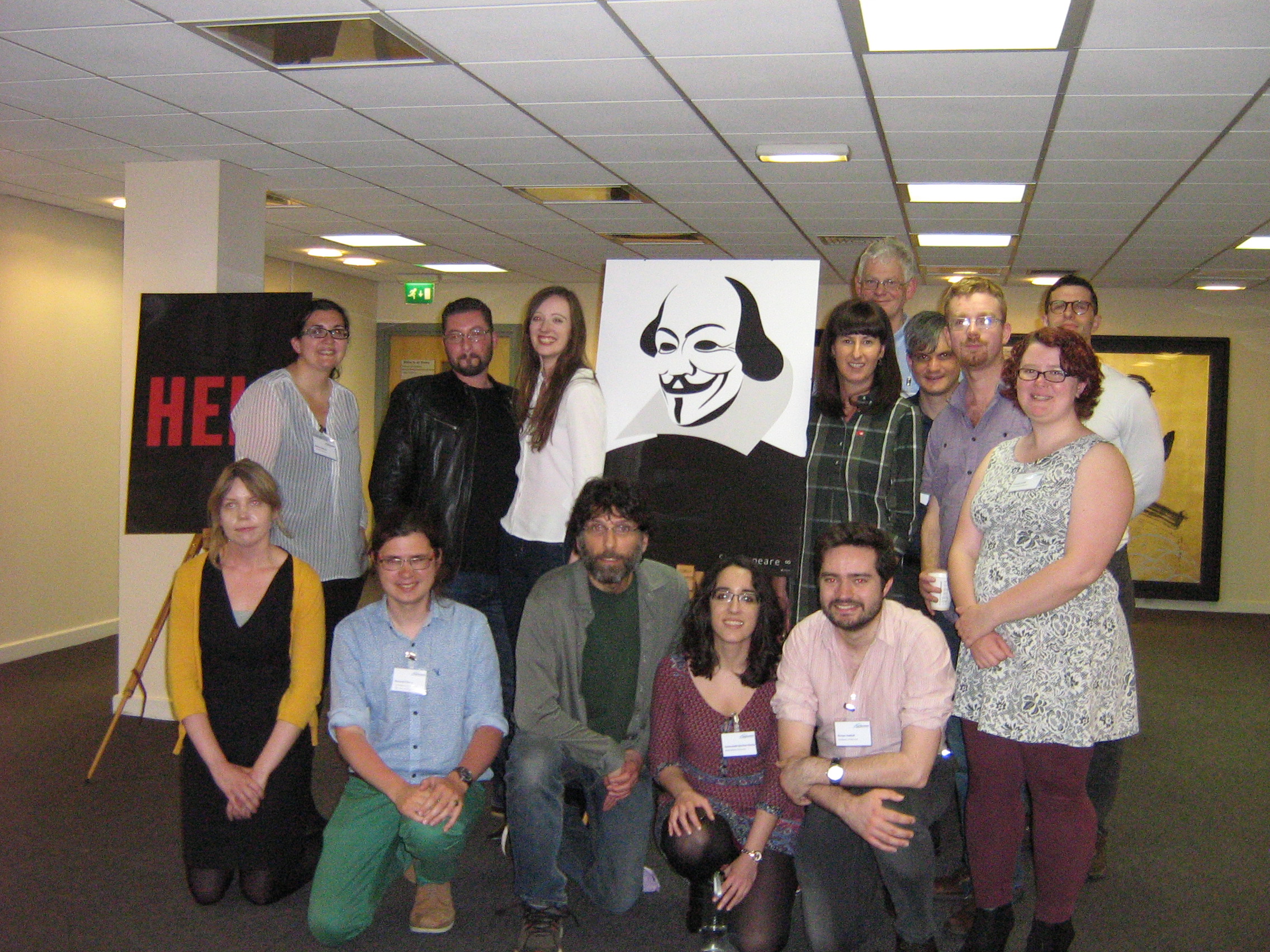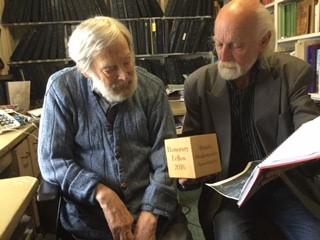BSA Bulletin for June 2017
7th June 2017
THE BSA BULLETIN – JUNE 2017
BSA election of new Trustees
As several Trustees are now approaching the end of their terms of service, the Board of Trustees of the British Shakespeare Association wishes to appoint new Trustees to take up positions on the Board in September 2017. The position of Trustee is voluntary (with reasonable expenses covered) so we are looking for members of the BSA who are willing to give of their time to further the aims of the BSA across its four main constituencies of members: academic researchers, teachers, theatre practitioners and members of the public. Nominations (including self-nominations) should be made by 7th July and elections by the membership will be held electronically for 6 weeks (18th August) so that new Trustees can be introduced at the Board meeting on 16th September. Full details can be found here: http ://www . britishshakespeare . ws/bsa-news/election-of-new-trustees/
Call For Participants: ‘Shared Futures’, English Association and University English Conference, Newcastle 5-7 July 2017
There is still time to participate in our panels at the Shared Futures conference. Choose from ‘Why Shakespeare now?’ (Chair Susan Anderson); Panel 2 ‘Sharing Shakespeare’s Language (workshop chaired by Alison Findlay, Andrew Jarvis and James Harrison-Smith) and Panel 3: Sharing Futures across primary, secondary and university education (Chairs: Chris Green and Karen Eckersall). Further details can be found on the BSA website. More information on: http ://www . britishshakespeare . ws/join-our-panels-at-the-shared-futures-conference/ If you would like to participate but do not have access to financial support (e.g. from a university or school) the BSA might be able to help. Contact us to find out how to apply for a BSA Bursary. http ://www . englishsharedfutures . uk/
Nominations open for our Honorary Fellowships for 2018
This year, 2017, the BSA Honorary Fellowships are to be given to Sarah Stanton—formerly Publisher of Shakespeare and Early Modern Literature Studies at Cambridge University Press—and to the actor Adrian Lester. The BSA’s Fellowship Committee would like to invite all current Members of the BSA to offer nominations for next year’s award. The choice for nomination should fulfil the following criterion: ‘The title of ‘Honorary Fellow of the British Shakespeare Association’ should be reserved for those who, at whatever level, have made, or are making, over a significant period of time, a major contribution to the field of Shakespeare activities, whether it be in Scholarship, Education more generally, or in the Performance of the plays.’ All nominations, from whichever area or constituency, require the names of two nominators (a Proposer and a Seconder) and a formal written proposal, stating the case for nomination. This text should be at least 250 words in length. The closing date for nominations is 1st September 2017. Full information on how to submit nominations are available here: http ://www . britishshakespeare . ws/bsa-news/nominations-open-for-our-2018-fellowships/
Annual conferences for 2018, 2019, and 2020
The institutions that will host our three upcoming annual conferences and their titles are as follows. The BSA Annual Conference of 2018 will take place at Queen’s University Belfast on 14-17 June under the title Shakespeare Studies Today. Swansea University will host the conference in 2019 with the title Shakespeare: Race and Nation, while in 2020 it will take place at the University of Surrey and the theme will be Shakespeare in Action. We would like to thank all three institutions for the hard work they have invested in their applications, and we look forward to visiting Belfast, Swansea, and Surrey in due course. The Belfast and Swansea BSA conferences will be the first to take place in Northern Ireland and in Wales, respectively, which is enormously exciting, as the BSA would have visited all four constituent nations of the United Kingdom by the end of 2019.
Interview with Professor Peter Hulme
The BSA website features an interview in which Peter Hulme (Emeritus Professor of English (University of Essex) discusses his work as editor of The Tempest and writer on world literature and postcolonial theory with John Drakakis (Emeritus Professor of English, University of Stirling). It is available here: http ://www . britishshakespeare . ws/bsa-news/peter-hulme-in-conversation-with-john-drakakis/
New Editors for the Education Network Blog
As of February 2017, following on from the excellent work of Dr Sarah Olive, our Education Network blog will be jointly edited by the BSA’s two Teaching Trustees: Chris Green and Karen Eckersall. Chris and Karen will welcome any contributions to the education network blog. You can contact them with articles, ideas or questions at the following email addresses: Chris Green – Karen Eckersall – More information on:
Teachers’ Conference: Shakespeare and Creativity, The Shakespeare Centre, Stratford-upon-Avon, 3-5 August 2017 POSTPONED
Please note that the first Teachers’ Conference organised by the BSA and the Shakespeare Birthplace Trust has now been postponed until further notice. We will keep members informed of future updates.
Teaching Shakespeare 12 is out!
We are pleased to announce that the twelfth issue of Teaching Shakespeare and the first ever summer issue of the magazine, with articles on Shakespeare in Hanoi, on Shakespeare and autistic students, on young offenders and Othello, and on digitized promptbooks, is now available for free download. You can download your free copy here: http ://www . britishshakespeare . ws/bsa-news/teaching-shakespeare-12-is-out/
TNT’s Twelfth Night at Japan Women’s University
On Thursday 11 May, Japan Women’s University (JWU) hosted a performance of TNT Theatre Britain’s or International Theatre Company London’s current, world-touring production Twelfth Night in its Oufu Kaikan (hall). TNT performed a cut-down version of the play, with a handful of actors. Their set for touring, loosely early modern costumes and props fitted into a few suitcases. The company played multiple instruments and sang, with no pre-recorded music used. Read more here: http ://www . britishshakespeare . ws/shakespeare-in-education/tnts-twelfth-night-at-japan-womens-university/
Lost in Pronunciation: Ben Crystal’s Japanese tour
During the second week of May, Ben Crystal gave a series of talks at three Japanese universities on the performance of Shakespeare using original early modern pronunciation. You can read more here: http ://www . britishshakespeare . ws/shakespeare-in-education/lost-in-pronunciation-ben-crystal-at-waseda-university/
BSA funding available for conference, events, and other activities
The BSA is able to award small amounts of money to Shakespeare-related education events, academic conferences and other activities taking place in the UK. For more information or to apply for funding, please email the Chair of the Events Committee, Susan Anderson (Susan.Anderson@shu.ac.uk ) or the Chair of the Education Committee, Sarah Olive (sarah.olive@york.ac.uk).
THE BSA MEMBERS’ BULLETIN
We are pleased to advertise news and activities by our members and other Shakespeare associations. If you would like to advertise a Shakespeare-related activity, please email our Membership Officer, José A. Pérez Díez, at membership@britishshakespeare.ws. Items below are not affiliated with or endorsed by the BSA – please use individual contact details for more information.
The Story of the Shakespeare Club of Stratford-upon-Avon 1824-2016, Susan Brock and Sylvia Morris, available now.
In their new book, The Story of the Shakespeare Club of Stratford-upon-Avon 1824-2016, Susan Brock and Sylvia Morris answer the question “How did it come about that a small market town in the centre of England became the focus of the worldwide worship of Shakespeare?” After all, London’s claims were much stronger being the place where he became famous and spent the most productive years of his life. The story of the part played by the Shakespeare Club of Stratford-upon-Avon, set up nearly 200 years ago by ordinary townsfolk and still in existence today, is told in this alternative history of the town. The Club was responsible for organising the first local festivities for Shakespeare’s Birthday on 23 April in 1827, 1830 and 1833. It played an important part in saving Shakespeare’ s Birthplace and setting up the Birthplace Trust. It worked towards the preservation of the Shakespeare monuments and the graves in Holy Trinity Church and it played a huge part in setting up the theatres in Stratford so that Shakespeare’s plays have a permanent home for their performance outside London. The fully-illustrated book is based on documentary evidence provided by the rich archives of the Club dating back to its foundation in 1824 and the archives of Stratford-upon-Avon which are preserved in the collections of the Shakespeare Birthplace Trust. Published by the Shakespeare Club of Stratford-upon-Avon, copies (£12.99) are available direct from www . stratfordshakespeareclub . org or write to stratfordshakespeareclub@gmail.com.
Shakespeare, Media, Performance and Technology Conference, University of Exeter, 24th June 2017
Shakespeare Bulletin is delighted to welcome scholars from around the world to examine the recent significant changes in how Shakespeare’s plays are performed and disseminated through old and new technologies and media. Marking the end of Pascale Aebischer’s term as General Editor of Shakespeare Bulletin, this one-day event responds to the technological turn in performance studies evident in a significant part of the work submitted to the journal between 2012 and 2017 and aims to bring together a range of scholarly approaches to the technologies of performance that shape the production of Shakespeare and his contemporaries today. Registration for the event, including refreshments and lunch, is free, sponsored by Shakespeare Bulletin. Places are strictly limited to 35 delegates, so we recommend an early registration to avoid disappointment. Registration closes on 31st May. You can register here: https://www . eventbrite . co . uk/e/shakespeare-media-performance-and-technology-conference-tickets-34394466776
King Lear (alone), one-man play with inamoment theatre.
After its highly acclaimed full outing last year, inamoment theatre’s one-man play King Lear (alone) is touring again in 2017, visiting festivals and theatre venues up and down the country. Using mostly Shakespeare’s words, and set in a modern day care home, it’s an astonishing tour de force by Bob Young, retelling the events that led to Lear’s tragedy. “I left the theatre feeling like I’d been exposed to a flawed individual at their most honest . . . ” “King Lear (Alone) is a gripping production and the formidable performance given by Bob Young makes it compelling viewing.” “Bob Young in the title role, is a powerful performer. His tormented character takes shape thanks to his profound voice, whilst his presence on stage appears carefully studied….. In Bob Young’s poignant (portrayal), the play is quite intense.” The play has been designed for performance in Schools, Theatres, Conferences, Halls etc. (we also offer a separate King Lear workshop), all details can be found at www . kinglearalone . uk. Please contact Frank Bramwell at inamomenttheatre@gmail.com to make booking enquiries.
 We are currently carrying out an evaluation of the impact of Teaching Shakespeare, the British Shakespeare Association magazine, which aims to provide support for Shakespeare educators across sectors. This evaluation is being carried out by the editor and founder of the magazine Dr Sarah Olive and research assistant at the University of York, Dr Chelsea Swift. The British Shakespeare Association are also a named project partner. The aim of this evaluation is to evidence the impact of the magazine on its non-academic readership (and those who hold roles in other sectors as well as academia). This is with a view to gaining a better understanding of how it is read and used by practitioners, and how its relevance to educators and usefulness for practitioners might be strengthened. We are interested in how and why you read the magazine and whether and how the magazine has influenced or changed your thinking about, attitudes towards and practices when teaching Shakespeare.
We are currently carrying out an evaluation of the impact of Teaching Shakespeare, the British Shakespeare Association magazine, which aims to provide support for Shakespeare educators across sectors. This evaluation is being carried out by the editor and founder of the magazine Dr Sarah Olive and research assistant at the University of York, Dr Chelsea Swift. The British Shakespeare Association are also a named project partner. The aim of this evaluation is to evidence the impact of the magazine on its non-academic readership (and those who hold roles in other sectors as well as academia). This is with a view to gaining a better understanding of how it is read and used by practitioners, and how its relevance to educators and usefulness for practitioners might be strengthened. We are interested in how and why you read the magazine and whether and how the magazine has influenced or changed your thinking about, attitudes towards and practices when teaching Shakespeare.


 The Offensive Shakespeare conference, sponsored by the BSA, will take place at Northumbria University next week, 23rd-24th May. The conference will be accompanied by a mini-exhibition of Shakespearean posters by the renowned graphic designer, Lex Drewinski. If you have a chance, do stop by to see these amazing images. You can see more of Lex Drewinski’s work on
The Offensive Shakespeare conference, sponsored by the BSA, will take place at Northumbria University next week, 23rd-24th May. The conference will be accompanied by a mini-exhibition of Shakespearean posters by the renowned graphic designer, Lex Drewinski. If you have a chance, do stop by to see these amazing images. You can see more of Lex Drewinski’s work on 
